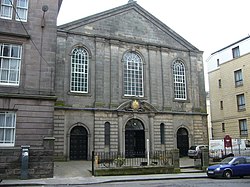The Week of Prayer for Christian Unity
Day Five: Together... we are called into fellowship
Ecuminism 1987
The Clergy Review January 1987
Editor, Questions raised by the present state of ecumenism, 11 Articles
The Church, The Churches and the World
By James Quinn, S.J.
Church of the Sacred Heart, 28 Lauriston Street, Edinburgh, Scotland
Extract
§ 11 The Churches
The will of Christ
At the Last Supper Christ prayed for his Church, that it might be one. Unity among all his .followers is clearly his great desire. This unity is to be complete and perfect, having as its source and model the unity of Father, Son and Holy Spirit.
But Christians, though accepting Christ as their Lord, find themselves divided from each other in different ways. In obedience to Christ we must do all in our power to undo division- among Christians, and in their place to build up true Christian unity.
The Second Vatican Council, in its Decree on Ecumenism, points out that work for Christian unity is a duty of every Catholic. It is a work for the whole Church, not for bishops and priests only. Each parish should have its own contribution to make towards the Church's commitment in this field.
The ecumenical movement is essentially a meeting of Churches, through their members. But it must not be simply the enthusiasm of the few: it must be the responsibility of all, according to each one's talents and opportunities.
The way of renewal
The Decree on Ecumenism also points out that the way to Christian unity is through spiritual renewal within each Church, and in the life of every Christian.
The unity of the Church is the gift of the Holy Spirit, the bond of love. It is therefore a work that demands our co-operation through prayer. Prayer is the first and necessary condition of work for Christian unity.
Work for Christian unity requires also the fruits of prayer in our individual lives and in the life of the whole Church. It demands spiritual renewal, holiness of life, fidelity to Christ.
It asks for a spirit of penitence for sins against charity. There arc many personal and community barriers - suspicion, prejudice, lack of charity, bad example - which must be removed before the Holy Spirit can heal our divisions.
The spirit of unity
If we are to grow together into the fullness of unity, we must first want unity. We must want it, not for our own glory but in humble obedience to Christ.
We should want other Christians to be one with us because we miss their presence and feel somehow incomplete without them. We must see them, not as rivals or strangers, still less as enemies, but as fellow-pilgrims who belong to us in a very real sense, through our spiritual kinship with them by baptism.
There should be a spirit of forgiveness where we may think that other Christians have wronged us. There should be a spirit of repentance for our own sins against other Christians.
Above all, we should not live in the past but in the reality of the present, and in hope of a more Christian future.
The Eucharist and Christian unity
The Church is essentially a communion of faith, hope and love. It is a communion with Father, Son and Holy Spirit, as well as a communion with all its members in the Body of Christ.
Baptism is the basic, initial sacrament of Christian unity. It establishes a sacramental bond among all who have been baptized.
Holy Communion is the crowning sacrament of Christian unity, setting the seal on perfect unity.
The supernatural communion which is the Church must be seen as a true community in itself, but also as a community seeking to welcome into its unity the whole family of mankind.
The article below:
23 Jan 2013
www.indcatholicnews.com/news.php?viewStory=15970. Apr 14, 2010 – The hymns of Father James Quinn SJ are found in almost every contemporary English language hymnal, taken from the collection New Hymns ... 2.















.jpg)
